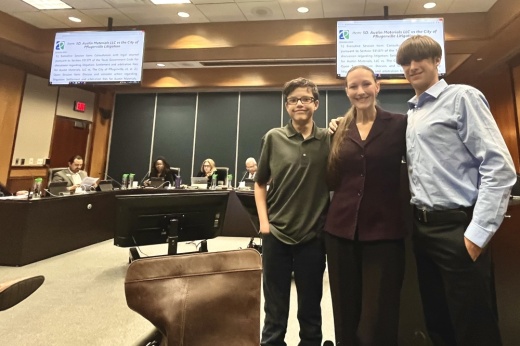Students in Pflugerville ISD with a lunch debt over $6 must forfeit hot meals for an alternative lunch—cheese sandwiches. The original food is then trashed, according to a presentation by Pfood Pfairness to Pflugerville City Council Nov. 14.
As food trays are surrendered and cheese sandwiches doled out, the lunchtime ritual has become a spectacle of embarrassment for those students in financial need, Pfood Pfairness Executive Director Corey Ann Amador said.
“They’ll go up to pay for [their lunch] and as soon as the cashier sees that they have no funds in their account, that food is taken from them, thrown into the trash and they are handed a cold cheese sandwich in front of their peers,” Amador said. “No child should be forced to choose between hunger and humiliation.”
Council awarded a $100,000 contribution—double the amount originally proposed—to Pfood Pfairness, a nonprofit dedicated to ensuring all students receive the same lunches regardless of financial status.
The gist
John and Maxx Amador, Hendrickson High School students and program founders, formed the Pfood Pfairness nonprofit in 2023 after the school district instituted new policies regarding school lunch debt and alternative lunches.
Pflugerville ISD returned to pre-COVID-19 policies as the district is no longer receiving federal pandemic funding for student lunches, according to a statement from PfISD.
Changes stemmed from the increasing debt being incurred by the district, amounting to more than $180,000.
Federal regulations mandate school districts are liable for any outstanding lunch balances, which are paid from the district’s general fund. This ultimately results in reduced funding for student programs and teacher resources, according to PfISD information.
The district has not increased meal rates in five years, and in recent years PfISD's budget has increased for negative lunch balances from $18,000 to $30,000.
Students are still able to select a fruit, vegetable and drink option to accompany their alternative entree, and breakfast is still free to all PfISD students.
A closer look
There are 25,436 students on 34 school campuses in Pflugerville ISD. Corey Ann Amador noted 34% of those students are economically disadvantaged.
Standards for determining whether a child qualifies for free or reduced lunch are set on a national level and do not account for local costs of living or family dynamics.
Federal poverty standards dictate who qualifies for free or reduced lunch, the same standards used to determine eligibility for state benefits such as SNAP and Medicaid.
A family of four making a little more than $55,000 annually will not qualify for reduced lunches. According to recent Pflugerville Community Development Corporation data, the average salary for the area is about $126,000.
“As you can see, those numbers are ridiculously low,” Corey Ann Amador said. “It doesn’t account for location, and I think that’s one of the problems, unfortunately, that’s on a federal level.”
The Pfood Pfairness program targets not only students who qualify for state benefits, but also a gap found from those experiencing financial need but do not meet the free or reduced lunch requirements.
Through fundraising efforts, Pfood Pfairness covered the entire outstanding balance of free and reduced lunch accounts in August, amounting to $12,682.
The approach
Pfood Pfairness has targeted businesses in the area for donations, receiving contributions from companies such as H-E-B, Costco, Whataburger and Walmart. The nonprofit organization also accepts donations from individuals.
Corey Ann Amador and her two sons often reach out to school social workers to identify students in need of lunch assistance.
It was noted that because of confidentiality concerns the program has encountered a variety of road blocks from the district.
“That concerns me a little bit. Here you are trying to help children who are missing a hot meal, and we have professionals in the district, who I’m sure recognize the need and assist their children to have hot meals, but that seemingly aren’t quite working with you in a very cooperative way,” Mayor Victor Gonzales said.
Place 5 council member Jim McDonald offered resource information to help navigate some of the district regulations. He urged the program to continue its efforts, referencing studies that indicate a positive correlation between providing meals to students and higher grades as well as a decrease in disciplinary referrals.
Looking ahead
With the city and other donor contributions, the organization’s goal is to eliminate alternative lunches for all students in the district.
Council members ask that with the donation, the program maintain simple tracking of the individuals helped, in hopes that the data can be used in the future to identify any pockets of increased food insecurity throughout the district.





